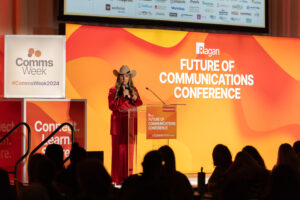Charting the path forward: Highlights from New York Women in Communications’ CommsWeek event
“Communications for a Changing World” gathered communicators of all levels to chart a way forward together.

Earlier this week, members of New York Women in Communications came together at the Empire State Building for a morning of discussion to answer some of the most pressing questions facing comms pros in an ever-shifting world.
The event, hosted by Ragan and held as a part of Communications Week, spoke about the changing perception of DEI, innovations in comms and more. Between technology, politics and social issues to navigate, it’s clear that communicators face a rapidly changing world in which to do their work.
New York Women in Communications President Laura Brusca praised the unity and power of the women who work so hard to make the comms profession so vibrant.
“Seeing all my sisters here today has made me feel so good inside,” Brusca said. “Even when we’re feeling a little down, we can unite as sisters, and that’s what it’s all about.”
The power of purpose in communication
Patricia Tanaka, founder and chief joy officer at Joyful Planet, kicked off the morning’s events with a keynote that shared her perspectives on her 35-year career in comms. She told the audience that her greatest achievements in the field came when she aligned her on-the-job skills with her sense of purpose. Living her sense of purpose was directly tied to her founding multiple award-winning comms agencies and penning two best-selling books.
“Discovering and living our purpose is the single most powerful and efficient thing that we can do to unleash our leadership potential,” Tanaka said.
Tanaka added that without purpose, being an effective communicator or a workplace leader who can help others grow is a nearly impossible task.
“In the absence of purpose, we’re just doing triage, responding to others’ priorities rather than our own. Purpose-driven individuals create healthy, sustainable communities that work beyond the workplace.”
The future of DEI and how comms pros can approach it
In the wake of last week’s election, there’s been renewed talk of what the future of DEI efforts will be in the modern American workplace. In a panel titled “Overcoming the Backlash: Getting DEI Back on Track”, a group of seasoned DEI and comms experts prognosticated on what lies ahead, emphasizing the need to embed DEI in organization structures so it’s able to withstand the political winds of the day.
Christena Pyle, director of diversity at Omnicom, said that organizations need to stick to their principles when communicating about DEI work, and it needs to come through the authentic lens of the company’s mission and values.
“DEI is evolving,” she said. “What doesn’t evolve are the principles of representation and diversity.”
E.T. Franklin, global chief strategy officer and cultural fluency officer at Spark Foundry, told the audience that companies can’t just be silent and try to avoid picking a side in the fight for (and backlash against) DEI initiatives.
“There’s no going back to a time when brands could play it safe and sit on the sidelines,” she said. “Audiences today demand to know where you stand. If your leadership isn’t ready to declare a position, they’re not prepared for the realities of today’s consumer expectations.”
Singleton Beato, chief DEI officer at McCann Worldgroup, capped the discussion by saying that backlash to DEI programs often comes from fear of change, but a forward-thinking mindset that embraces that change is necessary to make a material difference.
“Rather than spending time on what has already happened, we need to make room for the other side of this conversation and be more inclusive as we architect our way forward,” Beato said.
“The way forward is not just about programs; it’s about embedding equity and inclusion into the structures and processes, creating lasting change.”
The strategies carrying comms forward
With all the technological and societal changes in the world around us, employees and leaders rely on communicators to keep them updated on the company line. As these changes arrive, so too must comms strategies change.
During the day’s final panel, the discussion turned to the changing communications landscape and how comms pros can adapt to keep their audiences engaged.
Nicole Moreo, director of customer insights for North America at LinkedIn, believes that these changes make it doubly crucial for communicators to have touchpoints across the organization, including connections in marketing, HR and finance, to make a tangible and informed difference.
“Orchestration is key. You need the conversations at the table to access the right information and data,” she said. “We’re the first people leaders call for advice, but they still don’t give us the budget to match our strategic role. It’s on us to show why communications deserve a real investment.”
As dispersed workforces evolve and technology changes, comms pros must also rethink their channel cadence to get the right eyes and ears on their messages. Liz Song, senior communications manager at Substack, urged communicators to give every messaging platform at their disposal a proper look, especially as consumption tastes change.
“Good media relations is good media relations, whether it’s a traditional outlet or a Substack newsletter,” Song said. “Treat it with the same respect, understand the audience and show up authentically.”
The panel closed out the morning touching on the role of AI in comms in the months and years to come. Yasamin Hagshenas, director of communications at American Express, said that comms pros need to be vigilant and ensure they’ve got the facts straight.
“With AI-written articles on the rise, it’s more important than ever to make sure our digital channels are up-to-date with factual, clear information,” Haghshenas said. “AI may draft the piece, but accuracy is on us — and that starts with clarity in our own content.”
Haghshenas added that the same vigilance that communicators approach AI with can help handle crises, especially in our rapidly evolving world.
“Crisis comms is a critical skill, but don’t be afraid of it. It’s scary, but it’s also fun, and knowing how to handle a crisis will set you up for long-term success.”
For more on CommsWeek events, click here.
Sean Devlin is an editor at Ragan Communications. In his spare time, he enjoys Philly sports and hosting trivia.







